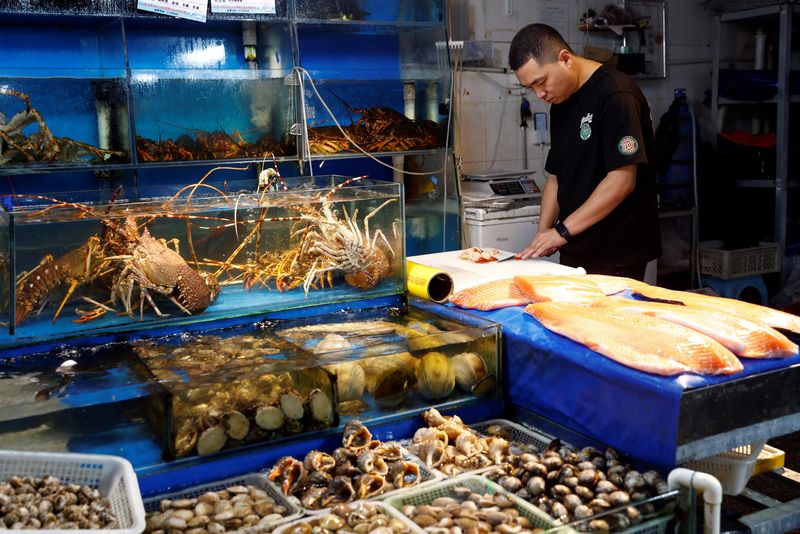By Katya Golubkova and Dominique Patton
TOKYO/BEIJING (Reuters) - China may be Japan's top seafood export market but marine products make up less than 1% of Tokyo's global trade, which is dominated by cars, so that Beijing's seafood ban on its neighbour is more of a political gesture, analysts say.
China has said Thursday's ban on seafood imports from Japan was prompted by concerns about the "risk of radioactive contamination" after it started releasing treated radioactive water from the wrecked Fukushima nuclear plant into the sea.
"The Fukushima water release is mostly of political and environmental significance," said Stefan Angrick, a senior economist at Moody's (NYSE:MCO) Analytics.
"Economically, the ramifications of a potential ban on Japanese food shipments are minimal."
Last year Japan exported seafood worth 87.1 billion yen ($600 million), or a fifth of its total, to top trading partner China, while Hong Kong, Japan's No.2 seafood market after mainland China, accounted for another 75.5 billion.
The Asian financial hub of Hong Kong and the gambling centre of Macau, both Chinese-ruled, are banning imports from 10 Japanese regions.
With Japan's total exports, dominated by cars and machinery, standing at close to 100 trillion yen, impact from China's move is negligible, analysts say.
The neighbours have complex ties rooted in history and the question of a regional balance of power.
Just last week Beijing criticised an agreement among the United States, South Korea and Japan to strengthen military and economic ties.
This week's ban "seems part of the features of China-Japan rivalry, which is of course entangled with China-U.S. competition, given Tokyo's close alliance relationship with Washington," said Chong Ja Ian of the National University of Singapore, who analyses how major power competition affects the domestic economies of third countries.
Seafood exports to China and Hong Kong accounted for just 0.17% of Japan's total exports last year, said Takahide Kiuchi, an economist with the Nomura Research Institute.
"Even if the import suspension continues for one year, the effect of depressing Japan's gross domestic product is only 0.03%."
Since the vast majority of Japan's fish catch is consumed at home, top seafood producers Maruha Nichiro and Nissui, expect limited impact from the ban, their spokespersons told Reuters.
The news hardly affected their shares, with Maruha Nichiro closing up 0.12% and Nissui adding 0.75%, moderately underperforming a rise of 0.87% in the benchmark Nikkei index.
NEITHER FOR CHINA
China's customs data shows it is sourcing all its bluefin tuna, one of the most expensive fish globally, from Japan, while scallops make up the largest import by volume.
Yet the 156,000 metric tons of seafood Japan supplied to China last year contribute less than 4% of the latter's seafood imports of $18.8 billion, the data shows, with Ecuador, India and Russia being the largest suppliers.
"It's not going to make many ripples in the seafood sector," said Gorjan Nikolik, senior global seafood specialist at Dutch bank Rabobank, referring to the ban. "Japan is not a relevant exporter."
Fukushima plant operator Tokyo Electric Power Co (Tepco) has vowed to compensate domestic businesses for damage from a fall in exports because of the ban.
About 82% of Japanese companies expect China to stay at least as important to their business in future as it is now, a Reuters corporate survey showed this month.

Mainland China was Japan's biggest export market in 2022, at $145 billion, data from the International Monetary Fund shows.
($1=145.3700 yen)